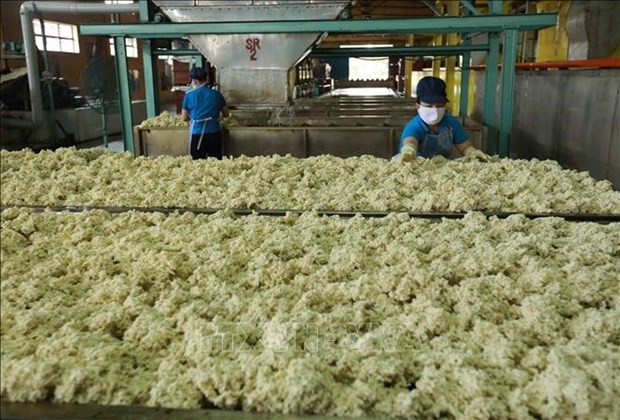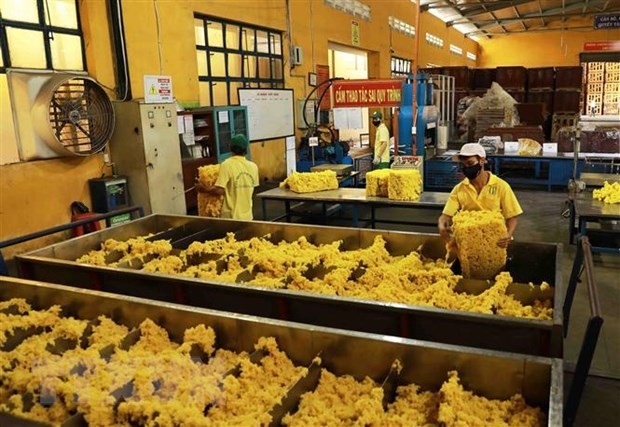 |
| At a rubber processing facility in Vietnam. Photo: VNA |
A series of exchanges and events aimed at promoting stronger ties and collaboration between Vietnamese and German rubber producers were held in Germany between April 20-27, according to Vietnam News Agency (VNA) on Saturday.
At an important commerce promotional occasion on April 21, which was attended by representatives from the Vietnamese Embassy in Germany, the Vietnam Trade Office, and various German rubber companies, Ambassador Vu Quang Minh emphasized the productive ties between the two nations in all areas, particularly after over 10 years of successful Vietnam-Germany strategic partnership.
Currently, Germany is the most significant trading partner for Vietnam in the European Union (EU), while Vietnam is the primary trading partner for Germany in Southeast Asia.
He praised the vitality of Vietnamese businesses and highlighted the growing strength of Vietnamese products, especially after the EU-Vietnam Free Trade Agreement (EVFTA) came into effect in 2020.
Phan Tran Hong Van, Deputy General Secretary of the Vietnam Rubber Association, recently revealed that Vietnam holds a sizable portion of the world’s rubber plantation area, accounting for 7.2%. In particular, the country has a total rubber plantation area of 929,500 hectares.
This impressive figure makes Vietnam the third largest rubber exporter in the world, with a 17.4% share of the total global rubber trade.
Rubber is an integral part of the German economy, providing essential components for the automotive, mechanical, and construction industries. Germany is a major importer of natural rubber and rubber-based products, which is indicative of the nation’s high demand for those materials.
According to statistics from the International Trade Center, in 2021, Vietnam was the fourth largest supplier of natural rubber to Germany, with 40,580 tonnes, worth USD 84.25 million.
At the event, Vietnamese and German businesses engaged in conversations about possible ways to enhance their partnership in the future. They delved into ways to strengthen their collaboration, while brainstorming new ideas and strategies.
Tobias Boysen, Sales Director of Weber & Schaer GmbH & Co.KG – a major German distributor of natural rubber and rubber products – lauded the exceptional quality of Vietnam’s rubber products. He expressed that his group would be increasing their imports of natural rubber, latex rubber, and other related products from the Southeast Asian nation.
Martin Sülzle, the head of the Import Department of the Blickle Räder & Rollen Group – a renowned global distributor of wheels of all types, with branches located in 120 countries – recently declared that his company has an increasing demand for rubber products imported from Vietnam, and is planning to establish a cooperation agreement with the Southeast Asian nation in this field.
The Vietnamese delegation visited a tire factory of Germany’s Continental AG — the world’s fourth-largest tire manufacturer — and the headquarters of Weber & Schaer and Corrie Maccoll to gain insight into product needs and market trends for Vietnam’s rubber exports.
 |
| The rubber industry needs a better grip on competitiveness in int’l market. Photo: VNA |
As the Covid-19 pandemic gradually abates, Vietnam’s rubber industry is facing a range of challenges, both from the global market and internal factors that impede the industry’s competitiveness. With the world markets becoming increasingly competitive and well-developed, Vietnam must take appropriate measures to keep up with the competition.
Tran Ngoc Thuan, the Chairman of the Vietnam Rubber Association (VRA), recently stated that the competition in the natural rubber-producing and exporting industries will become increasingly fierce, with price, product quality, commercial reputation, and the ability to meet sustainability standards on demanding markets becoming key differentiators.
On the contrary, the structure and varieties of natural rubber in Vietnam are still largely dependent on the Chinese market, thus failing to meet the demands of more stringent markets such as the US, Japan, and others. This creates a barrier for market penetration in these big markets.
In addition, the lack of a unified national management system and inadequate policy mechanisms, such as tax declarations, value-added taxes, and high-income taxes, have posed difficulties for the growth of industries and businesses.
Meanwhile, according to free trade agreements, natural rubber imported into Vietnam currently enjoys a tax rate of 0%, which will likely encourage businesses to prioritize choosing import markets from Thailand, Malaysia, and Indonesia. This, in turn, will create competitive pressure on domestic rubber businesses and could potentially lead to a decrease in prices.
The rubber product processing industry continues to grapple with the challenge of competing with imported goods. Unfortunately, there are still no technical barriers in trade to prevent the influx of low-quality imports from abroad, resulting in losses to consumers and unfair competition with domestic goods.
Momentum needed to help aviation industry take off
Many domestic airlines incurred heavy losses last year after being seriously affected by Covid-19. Along with Government support and their own efforts, airlines, however, have overcome the difficulties and are now posting profits. Bamboo Airways can be viewed as a “miracle” in this regard.





